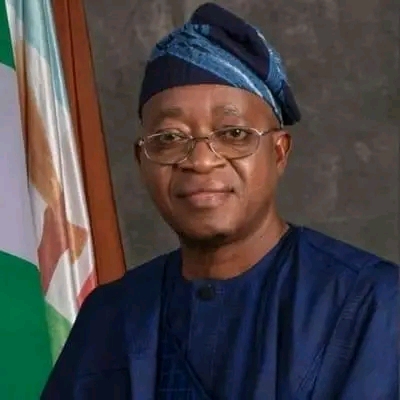
The Ministry of Marine and Blue Economy (MMBE) has initiated a partnership with the Infrastructure Concession Regulatory Commission (ICRC) and the Bureau of Public Enterprises (BPE) to adopt Public-Private Partnership (PPP) models aimed at improving efficiency, restructuring and modernising Nigeria’s ports.
This move aligns with the government’s efforts to rehabilitate and transform the nation’s port industry.
The Minister of Marine and Blue Economy, Adegboyega Oyetola revealed this during a courtesy visit from the director-general of ICRC, Dr. Jobson Ewalefoh and his management team at the ministry’s headquarters in Abuja.
Oyetola acknowledged that previous PPP models often encountered avoidable challenges, primarily due to private sector investors’ heavy reliance on government funds. He emphasised the need for the private sector to take greater responsibility in infrastructure management, stating, “The government has no business in business when it comes to infrastructure.” He urged ICRC and BPE to work with the private sector to stimulate investment and inject new life into the ports industry.
The minister also highlighted the issue of investors who propose ambitious business plans but struggle to secure the necessary funding after receiving government approvals. He noted the importance of identifying credible private partners who can deliver on their commitments to modernising the port sector.
Oyetola stressed that for PPP arrangements to work effectively in Nigeria’s ports sector, competent partners must be selected, and the proper PPP models must be established. He called on ICRC to collaborate with BPE to develop practical strategies that would enable private investors to rehabilitate and modernise the ports, ensuring the facilities can operate at maximum capacity.
Addressing concerns about delays in the rehabilitation of port terminals, Oyetola clarified that efforts were previously made to seek funding. “We are not delaying the rehabilitation of port terminals. It was taken to the Federal Executive Council (FEC) in 2021, but the proposal was rejected due to insufficient funds,” he explained. Additionally, he mentioned that negotiations with the World Bank stalled due to timing issues, reiterating the need to reconsider the terms and conditions for future partnerships.
Ewalefoh emphasised the importance of private sector involvement in the development of Nigeria’s marine sector. He noted that for the country to fully harness its marine resources, private-sector funding is essential. “The government must operate with a PPP approach,” Ewalefoh said, adding that Nigeria has the potential to become a major player in Africa’s marine industry.
He also pointed out that the 2006 concession of 26 port terminals was a positive step toward enhancing the sector. However, much more remains to be done to explore opportunities within the marine industry. Ewalefoh highlighted that attracting private-sector funding is critical to building and revamping Nigeria’s infrastructure.
Ewalefoh concluded by expressing confidence in the country’s potential to become a key player in West Africa’s coastal lines and beyond, stating, “Nigeria is blessed with vast marine resources, and with the right investment, we can transform the fortunes of this country.”

